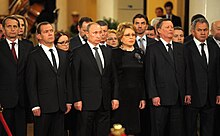
The modern history of Russia began with the Russian Republic of the Soviet Union gaining more political and economical autonomy amidst the imminent dissolution of the USSR during 1988–1991, proclaiming its sovereignty inside the Union in June 1990, and electing its first President Boris Yeltsin a year later. The Russian SFSR was the largest republic of the Soviet Union, but it had no significant independence before, being the only Soviet republic to not have its own branch of the Communist Party.
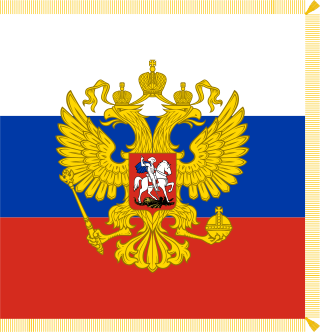
The president of the Russian Federation is the executive head of state of Russia. The president is the chair of the Federal State Council and the supreme commander-in-chief of the Russian Armed Forces. It is the highest office in Russia.

Boris Abramovich Berezovsky, also known as Platon Elenin, was a Russian business oligarch, government official, engineer and mathematician and a member of the Russian Academy of Sciences. He had the federal state civilian service rank of 1st class Active State Councillor of the Russian Federation.

In the Russian political lexicon, a silovik is a person who works for any state organisation that is authorised to use force against citizens or others. Examples are the Russian Armed Forces, the Russian national police, Russian national drug control, Russian immigration control (GUVM), the Ministry of Justice, the Federal Security Service (FSB), former KGB personnel, GRU, the Foreign Intelligence Service (SVR), and the Federal Protective Service (FSO). This word is also used for a politician who came into politics from these organisations.

Presidential elections were held in Russia on 26 March 2000. Incumbent prime minister and acting president Vladimir Putin, who had succeeded Boris Yeltsin after his resignation on 31 December 1999, was seeking a four-year term in his own right and won the elections in the first round.
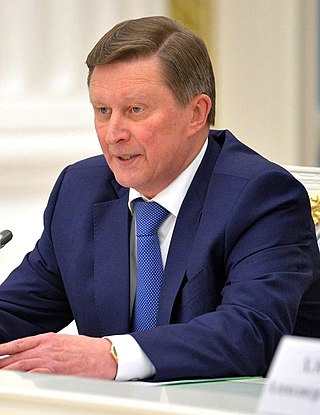
Sergei Borisovich Ivanov is a Russian senior official and politician who has been serving as the Special Representative of the President of the Russian Federation on the Issues of Environmental Activities, Ecology and Transport since 12 August 2016. He has the federal state civilian service rank of 1st class Active State Councillor of the Russian Federation.
Russian oligarchs are business oligarchs of the former Soviet republics who rapidly accumulated wealth in the 1990s via the Russian privatisation that followed the dissolution of the Soviet Union. The failing Soviet state left the ownership of state assets contested, which allowed for informal deals with former USSR officials as a means to acquire state property.

Arkady Shalvovich "Badri" Patarkatsishvili was a Georgian businessman who also became extensively involved in politics. He contested the 2008 Georgian presidential election and came third with 7.1% of the votes. From the early 1980s, until the time of his death, he was a flamboyant figure in business and was behind some of the most successful companies in today's Russia. From humble origins, he became the wealthiest citizen in Georgia with an estimated wealth of $12bn. He was also one of the country's largest philanthropists.

Alexei Leonidovich Kudrin is a Russian liberal politician and economist. Previously he served as the Chairman of the Accounts Chamber from 2018 to 2022 and as Minister of Finance from 2000 to 2011. Since December 9, 2022 Corporate Development Advisor at Yandex.
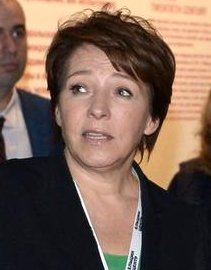
Tatyana Borisovna Yumasheva is the younger daughter of former Russian President Boris Yeltsin and Naina Yeltsina. Since 2009, Yumasheva has been a citizen of Austria.

Sergei Nikolayevich Yushenkov was a liberal Russian politician. He was assassinated on 17 April 2003, just hours after registering his political party to participate in the December 2003 parliamentary elections.
The International Foundation for Civil Liberties is a non-profit organization established by the Russian-British oligarch Boris Berezovsky in November 2000. The foundation is headquartered in New York City and headed by Alexander Goldfarb. The stated mission of the foundation is "to provide financial, legal, informational and logistical resources to secure human rights and civil liberties in Russia."
Yelena Tregubova is a Russian journalist. Her book The Tales of a Kremlin Digger detailed her work in the Kremlin pool.

Igor Ivanovich Sechin is a Russian oligarch and a government official, considered a close ally and "de facto deputy" of Vladimir Putin.
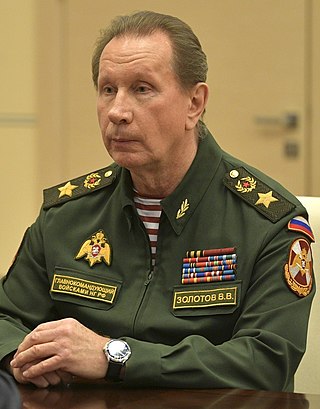
Viktor Vasilyevich Zolotov is a Russian military officer who is the Director of the National Guard (Rosgvardiya) and a member of the Security Council. Zolotov is a former bodyguard to former President Boris Yeltsin, former St. Petersburg Mayor Anatoly Sobchak, and current Russian leader Vladimir Putin. While working for Sobchak, Zolotov became acquainted with Putin, as well as figures in the St. Petersburg criminal underworld. A member of Putin's siloviki inner circle, Zolotov's rise to power and wealth happened after he became a close Putin confidant. The Zolotov family has obtained valuable land plots through dubious means.
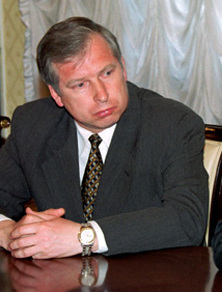
Viktor Vasilyevich Cherkesov was a Russian security services official.
Semibankirschina, or seven bankers, was a group of seven powerful Russian business oligarchs who played an important role in the political and economical life of Russia between 1996 and 2000. In spite of internal conflicts, the group worked together in order to re-elect President Boris Yeltsin in 1996, and thereafter to successfully manipulate him and his political environment from behind the scenes.

The Oligarchs: Wealth and Power in the New Russia is a 2001 non-fiction book written by Pulitzer Prize-winning author and Washington Post contributing editor David E. Hoffman. The book chronicles events of the transitional period in Russia, from the dissolution of the Soviet Union in the early 1990s, and the subsequent privatization in Russia, to the 1996 presidential election, the 1998 Russian financial crisis, and Vladimir Putin's rise to power in the late 1990s.
The political career of Vladimir Putin concerns the career of Vladimir Putin in politics, including his current tenure as President of Russia.
In the early 2000s, significant political changes took place in Russia with Vladimir Putin's rise to power. Putin, who previously held key positions in the security forces and government, became the successor to President Boris Yeltsin.


